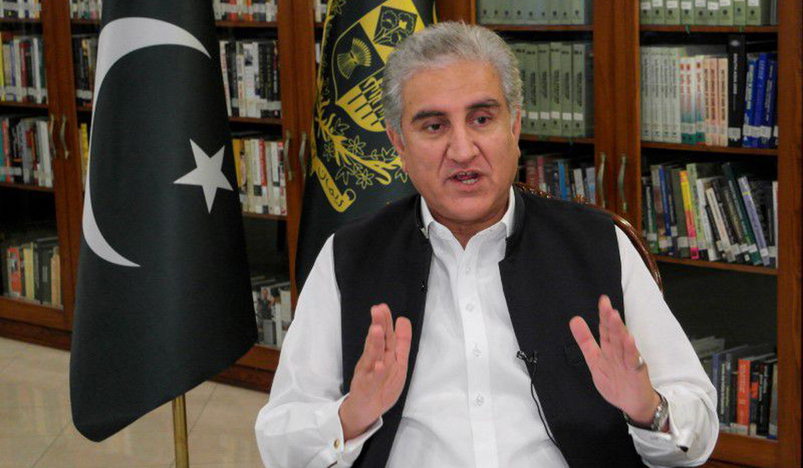
Pakistan's Foreign Minister Shah Mehmood Qureshi gestures as he speaks during an interview with Reuters at the Ministry of Foreign Affairs (MOFA) office in Islamabad, Pakistan June 25, 2020. Picture taken June 25, 2020. REUTERS/Salahuddin/Files
REUTERS
Pakistan on Monday said the international community needed to look into the "meltdown" of Afghan security forces in the face of Taliban offensives across Afghanistan, instead of blaming Pakistan for the fast-deteriorating situation.
Taliban fighters have swiftly gained territory across Afghanistan since May, including six provincial capitals in the last three days, as international forces near a complete withdrawal from the country after 20 years of fighting.
"The capacity-building, the training, the equipment ... where is it?" Pakistani Foreign Minister Shah Mehmood Qureshi asked at a news conference, referring to resources spent by other countries, particularly the United States, on bolstering Afghan national forces.
"Issues of governance and the meltdown of Afghan national defence forces need to be looked into," he said.
Pakistan cannot be held responsible for the failure of others, he said.
Kabul and several western governments say Pakistan's support for the Taliban allowed it to weather 20 years of war after being pushed from power in 2001 by a U.S.-led invasion of Afghanistan. The group today controls more territory that at any point since 2001.
Pakistan denies supporting the Taliban. Qureshi said Islamabad was not taking sides in Afghanistan.
"The lack of will to fight, the capitulation that we are seeing in Afghanistan ... can we be held responsible for that? No we cannot," Qureshi said, adding that Pakistan supported a political solution to bring peace to Afghanistan.
He said Pakistan had been instrumental in bringing the Taliban to the negotiating table with the United States and facilitated the resultant agreement between the two in Doha last year.
Pakistan, Qureshi said, had also helped convene peace talks between the Taliban and the Afghan government in September last year, which have since stalled.
Qureshi said Islamabad was concerned at the violence and the lack of progress in the talks, saying that Pakistan had most to lose from an unstable Afghanistan as a direct neighbour.
Questioning the pullout of U.S. forces, Qureshi said Pakistan thought the withdrawal would be tied to the progress in the peace talks.
Other regional countries, including Afghanistan, have also blamed what they termed a hasty and unconditional withdrawal of foreign troops for the success of the Taliban.
Qureshi said there would be a meeting in Doha on Wednesday of the "Troika", a platform to discuss Afghanistan led by the United States, China, Russia.
The meeting is three weeks before the Aug. 31 date that Washington set for the official withdrawal of its military forces in Afghanistan.
Reporting by Gibran Peshimam; Editing by Angus MacSwan and Grant McCool
.jpg)
Qatar Secures Place Among the World's Top 10 Wealthiest Nations
.jpg)
Hamad International Airport Witnesses Record Increase in Passenger Traffic

Saudi Arabia: Any visa holder can now perform Umrah

What are Qatar's Labour Laws on Annual Leave?
Leave a comment